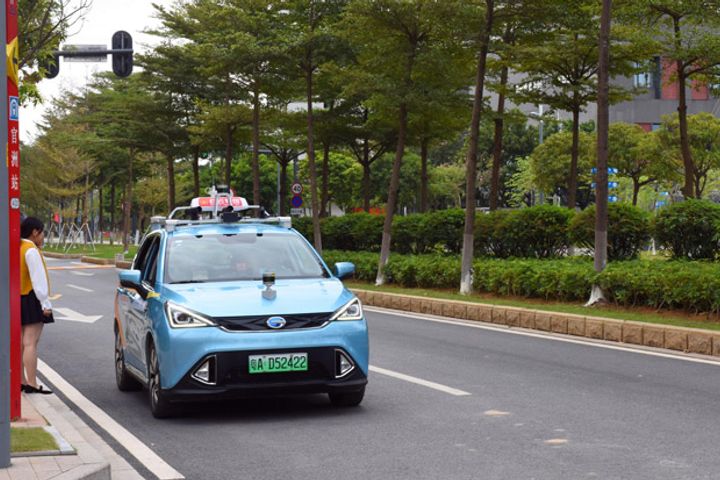 China's First Self-Driving Taxi Starts Testing in Guangzhou
China's First Self-Driving Taxi Starts Testing in Guangzhou(Yicai Global) Nov. 2 -- China's first driverless taxi started trial operations in Guangzhou yesterday, run by the Guangzhou Public Transport Group-operated Baiyun Taxi Group. The cabs are made by Chinese state-backed car firm GAC Group's new energy arm, and technical support comes from WeRide.ai, China's leading autonomous driving company developing Level 4 (L4) self-driving technology.
Autonomous driving technology is measured in six categories from L0 (fully manual) to L5 (fully autonomous).
Self-driving emblems emblazon the side of these driverless taxis that passengers can summon using a smartphone app. Fares start at CNY12 (USD1.70) per 3 kilometers.
Each cab has one or two safety supervisors from the operating team, with all said to have received over 200 hours technical training from WeRide.ai to ensure passenger safety.
The taxi is equipped with 2 laser radars, 3 cameras and 1 millimeter-wave radar, WeRide.ai technicians said.
The radar sensors and cameras transmit surrounding conditions to computers on the taxis, which analyze road conditions in real time and give optimal output commands to control them. The cabs can switch between driver and self-driving mode, so they can also run as ordinary taxis.
Major world automakers are conducting high-level autonomous-driving research and development. Bayerische Motoren Werke announced it will achieve mass production of electric vehicles capable of L3 self-driving in 2021. Toyota Motor plans to apply L4 self-driving technology in 2020. Volkswagen plans to introduce L4/L5 self-driving technology in 2021. Ford Motor will cooperate with Baidu to launch the test run of vehicles capable of L4 self-driving, announced on Oct. 31.
The L4 self-driving passenger vehicle jointly developed by Baidu and FAW Group's Hongqi unit was released at the 2018 Baidu World Congress in Beijing yesterday, FAW Group Chairman Xu Liuping announced mass production plan of the vehicle, which is to achieve small batch production next year, and mass production in 2020.
China's internet jumbos are also accelerating their expansion into the auto sector, and traditional carmakers are seeking cooperation with information technology companies. Many cities are building sites for self-driving tests, minting relevant regulations and making supporting facilities available.
Self-driving will continue to expand its application range, Ping An Securities believes. With the commercialization of technologies such as fifth generation wireless communications technology, the next one to two years are expected to mark the beginning of smart driving's rapid development.
Editor: Ben Armour